|
Books Should Be Free Loyal Books Free Public Domain Audiobooks & eBook Downloads |
|
|
Books Should Be Free Loyal Books Free Public Domain Audiobooks & eBook Downloads |
|
Top Authors |
|---|
|
Book type:
Sort by:
|
By: Arthur Schopenhauer (1788-1860) | |
|---|---|
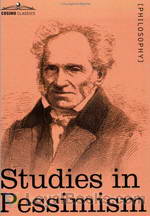 Studies in Pessimism
Studies in Pessimism
Arthur Schopenhauer, an early 19th century philosopher, made significant contributions to metaphysics, ethics, and aesthetics. His work also informed theories of evolution and psychology, largely through his theory of the will to power – a concept which Nietzsche famously adopted and developed. Despite this, he is today, as he was during his life, overshadowed by his contemporary, Hegel. Schopenhauer’s social/psychological views, put forth in this work and in others, are directly derived from his metaphysics, which was strongly influenced by Eastern thought... | |
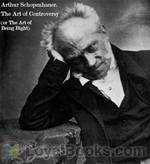 The Art of Controversy (or The Art of Being Right)
The Art of Controversy (or The Art of Being Right)
The Art of Controversy (or The Art of Being Right) (Die Kunst, Recht zu Behalten) is a short treatise written in 1831 by the German philosopher Arthur Schopenhauer in which he presents thirty-eight methods of gaining an unfair advantage in a debate and thereby being right even if you are wrong. Schopenhauer champions the virtue of dialectical argument, in his view wrongly neglected by philosophers in favour of logic, and goes on to discuss the distinction between our conscious intellectual powers and our will. The text is a favourite of debaters including the philosophers AC Grayling and Mary Warnock, and the Mayor of London Boris Johnson. | |
 The Essays of Arthur Schopenhauer: the Wisdom of Life
The Essays of Arthur Schopenhauer: the Wisdom of Life
| |
 The Essays of Arthur Schopenhauer; On Human Nature
The Essays of Arthur Schopenhauer; On Human Nature
| |
 The Essays of Arthur Schopenhauer; Religion, a Dialogue, Etc.
The Essays of Arthur Schopenhauer; Religion, a Dialogue, Etc.
| |
 The Essays of Arthur Schopenhauer; Counsels and Maxims
The Essays of Arthur Schopenhauer; Counsels and Maxims
| |
 The Essays of Arthur Schopenhauer; the Art of Controversy
The Essays of Arthur Schopenhauer; the Art of Controversy
| |
 The Essays of Arthur Schopenhauer; The Art of Literature
The Essays of Arthur Schopenhauer; The Art of Literature
| |
By: Walter Crane (1845-1915) | |
|---|---|
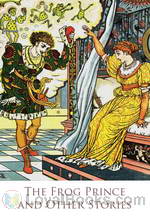 The Frog Prince and Other Stories
The Frog Prince and Other Stories
The three charming stories contained in The Frog Prince and Other Tales include a less-known fairy-tale called Princess Belle-Etoile besides the title story and Alladin and the Wonderful Lamp. Published in 1874, the tales are re-told by the famous illustrator Walter Crane, who has also provided some of the most lovely illustrations in the book. The book makes an ideal gift and both parents and children will certainly enjoy it. It's perfect for bedtime story-reading sessions and kids would love gazing at the beautiful Greek-style illustrations that are scattered throughout the book... | |
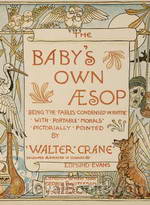 Baby's Own Aesop
Baby's Own Aesop
“Baby’s Own Aesop” presents the fables as one-stanza limericks, each “pictorially pointed” by Walter Crane, the noted painter and illustrator. He apprenticed to master wood-engraver, William James Linton, who furnished the draft of the book’s poems for Crane to edit. | |
 Line and Form (1900)
Line and Form (1900)
| |
 The Sleeping Beauty Picture Book
The Sleeping Beauty Picture Book
| |
 A Floral Fantasy in an Old English Garden
A Floral Fantasy in an Old English Garden
| |
 The Absurd ABC
The Absurd ABC
| |
 Eight Illustrations to Shakespeare's Tempest Designed by Walter Crane
Eight Illustrations to Shakespeare's Tempest Designed by Walter Crane
| |
 The Song of Sixpence Picture Book
The Song of Sixpence Picture Book
| |
 An Alphabet of Old Friends
An Alphabet of Old Friends
| |
 The Buckle My Shoe Picture Book
The Buckle My Shoe Picture Book
| |
 Queen Summer or, The Tourney of the Lily and the Rose
Queen Summer or, The Tourney of the Lily and the Rose
| |
 Mother Hubbard, Her Picture Book, Containing Mother Hubbard, The Three Bears, & The Absurd A, B, C.
Mother Hubbard, Her Picture Book, Containing Mother Hubbard, The Three Bears, & The Absurd A, B, C.
| |
By: Laurence Sterne (1713-1768) | |
|---|---|
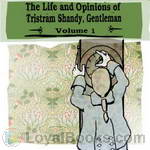 The Life and Opinions of Tristram Shandy, Gentleman
The Life and Opinions of Tristram Shandy, Gentleman
This is volume 1 of 4.The Life and Opinions of Tristram Shandy, Gentleman (or, more briefly, Tristram Shandy) is a novel by Laurence Sterne. It was published in nine volumes, the first two appearing in 1759, and seven others following over the next 10 years. It was not always held in high esteem by other writers (Samuel Johnson responded that, “Nothing odd can last”), but its bawdy humour was popular with London society, and it has come to be seen as one of the greatest comic novels in English, as well as a forerunner for many modern narrative devices. | |
 A Sentimental Journey Through France and Italy
A Sentimental Journey Through France and Italy
After the bizarre textual antics of “Tristram Shandy”, this book would seem to require a literary health warning. Sure enough, it opens in mid-conversation upon a subject never explained; meanders after a fashion through a hundred pages, then fizzles out in mid-sentence – so, a plotless novel lacking a beginning, a middle or an end. Let us say: an exercise in the infinitely comic. “There is not a secret so aiding to the progress of sociality, as to get master of this short hand, and to be quick in rendering the several turns of looks and limbs with all their inflections and delineations, into plain words... | |
 A Political Romance
A Political Romance
| |
By: David Hume (1711-1776) | |
|---|---|
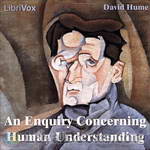 An Enquiry Concerning Human Understanding
An Enquiry Concerning Human Understanding
The Enquiry Concerning Human Understanding is a shortened and simplified version of Hume’s masterpiece A Treatise of Human Nature. It sought to reach a wider audience, and to dispel some of the virulent criticism addressed toward the former book. In it, Hume explains his theory of epistemology, and argues against other current theories, including those of John Locke, George Berkeley, and Nicolas Malebranche. | |
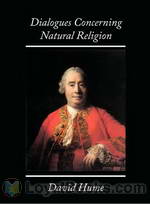 Dialogues Concerning Natural Religion
Dialogues Concerning Natural Religion
In Dialogues Concerning Natural Religion, philosopher David Hume examines whether belief in God can be rational. The work takes the form of a debate between three characters: Cleanthes, who argues that the existence and nature of God can be empirically verified; Demea, who argues that God is completely beyond human knowledge; and Philo, a philosophical skeptic widely thought to represent Hume’s own beliefs. Much of the debate centers around Cleanthes’ presentation of the analogical argument from design... | |
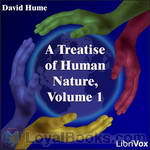 A Treatise Of Human Nature
A Treatise Of Human Nature
This book, published in two volumes called “books” by the author, is a treatment of everything from the origin of our ideas to how they are to be divided. It includes important statements of Scepticism and Hume’s experimental method. Part 1 deals with the nature of ideas. Part 2 deals with the ideas of space and time. Part 3 deals with knowledge and probability. Part 4 deals with skeptical and other systems of philosophy, including a discussion of the soul and personal identity.This is a recording of Volume I (or Book 1). Volume II (which contains Books 2 and 3) is in production at the moment. | |
 History of England from the Invasion of Julius Caesar to the Revolution of 1688, Volume 1A
History of England from the Invasion of Julius Caesar to the Revolution of 1688, Volume 1A
David Hume is one of the great philosophers of the Western intellectual tradition. His philosophical writings earned him lasting fame and renown; his historical writing earned his bread and butter. His "The History of England from the Invasion of Julius Caesar to the Revolution of 1688", published between 1754 and 1764, was immensely popular and Hume wrote that "the copy-money given me by the booksellers much exceeded any thing formerly known in England; I was become not only independent, but opulent... | |
 Enquiry Concerning the Principles of Morals
Enquiry Concerning the Principles of Morals
| |
 Essays
Essays
| |
 The History of England, Volume I
The History of England, Volume I
| |
By: Alfred, Lord Tennyson (1809-1892) | |
|---|---|
 In Memoriam A.H.H.
In Memoriam A.H.H.
In Memoriam is Tennyson’s elegiac tribute to his friend Arthur Henry Hallam, who died in 1833 at the age of 22. Tennyson wrote this long poem over 17 years as a chronicle of his mourning process. The poem became a favorite of Queen Victoria when she was grieving for her husband, and was one of the most popular and artistically influential poems of the Victorian period. | |
By: Harry Harrison (1925) | |
|---|---|
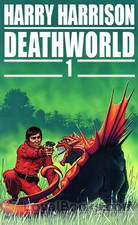 Deathworld
Deathworld
Jason dinAlit, an inhabitant of the planet Porgostrosaand, is a fast talking, conniving, tough as nails, gun toting gambler whose ethics wax and wane with each planet he travels to. He also has amazing psionic abilities which means he is gifted with a variety of psychic abilities including telekinesis, telepathy, pyrokinesis and a host of other interesting capabilities. He is not above using these to tip the odds in his favor while gambling. A chance meeting with Kerk Pyrrus who is the Ambassador of planet Pyrrus ends up with dinAlit traveling back with the Ambassador to Pyrrus... | |